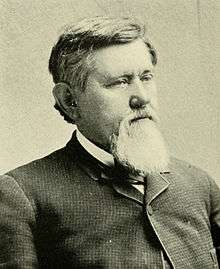James Z. George
| James George | |
|---|---|
 | |
| United States Senator from Mississippi | |
|
In office March 4, 1881 – August 14, 1897 | |
| Preceded by | Blanche Bruce |
| Succeeded by | Hernando Money |
| Personal details | |
| Born |
October 20, 1826 Monroe County, Georgia |
| Died |
August 14, 1897 (aged 70) Gulfport, Mississippi |
| Political party | Democratic |
James Zachariah George (October 20, 1826 – August 14, 1897) was an American lawyer, writer, and politician and Confederate politician and military officer. He was known as Mississippi's "Great Commoner."
Biography
James Z. George was born in Monroe County, Georgia, but moved to Mississippi when his widowed mother remarried. He served as a private in the Mexican-American War under Colonel Jefferson Davis. On his return, George studied law and was admitted to the bar. In 1854 he became a reporter of the Supreme Court of Mississippi and, over the next 20 years, George prepared a 10-volume digest of its cases.
As a member of the Mississippi Secession Convention, George signed the Ordinance of Secession. A Confederate colonel of the 5th Mississippi Cavalry during the Civil War, he was captured twice and spent two years in a prisoner of war camp, where he conducted a law course for his fellow captives.
After the war, he returned to Mississippi and resumed the practice of law. In 1879 he was appointed to the Supreme Court of Mississippi and immediately was chosen chief justice by his colleagues.
From 1881 until his death, George represented Mississippi in the United States Senate, where he was recognized for his skills in debate, helped frame the future Sherman Anti-Trust Act, introduced the bill for agricultural college experiment stations, and encouraged the establishment of the Department of Agriculture. He also served as a member of the Mississippi Constitutional Convention of 1890 and successfully defended the constitution before the Senate and the Supreme Court.
George died in Mississippi City, Mississippi, where he had gone for health treatment. He is buried, along with his wife, Elizabeth Brooks (Young) George,[1] in Evergreen Cemetery in North Carrollton, Mississippi.[2] George's wife Elizabeth was the granddaughter of Col. William Martin Jr. of Tennessee, and the great-granddaughter of General Joseph Martin, an early Virginia explorer and Revolutionary War commander.[3]
In 1931, the state of Mississippi donated a bronze statue of George to the United States Capitol's National Statuary Hall Collection.
The J. Z. George High School in North Carrollton, Mississippi is named in his honor, which is less than two miles from his burial place. In addition, George County, Mississippi, is also named in his honor.
See also
- Battle of Collierville - Col. J. Z. George captured.
References
- ↑ Family History Compiled by Lucy Henderson Horton, Press of the News, Franklin, Tennessee, 1922
- ↑ The Political Graveyard: Index to Politicians: George
- ↑ Family History Compiled by Lucy Henderson Horton, Press of the News, Franklin, Tenn., 1922
Further reading
- Timothy B. Smith. James Z. George: Mississippi's Great Commoner (University Press of Mississippi; 2012) 256 pages; scholarly biography
External links
- A story of James Z. George's hometown hidden from history
- On-line biography
- United States Congress. "James Z. George (id: G000127)". Biographical Directory of the United States Congress.
| United States Senate | ||
|---|---|---|
| Preceded by Blanche K. Bruce |
U.S. Senator (Class 1) from Mississippi 1881–1897 Served alongside: Lucius Q. C. Lamar, Edward C. Walthall, Anselm J. McLaurin, Edward C. Walthall |
Succeeded by Hernando D. Money |
